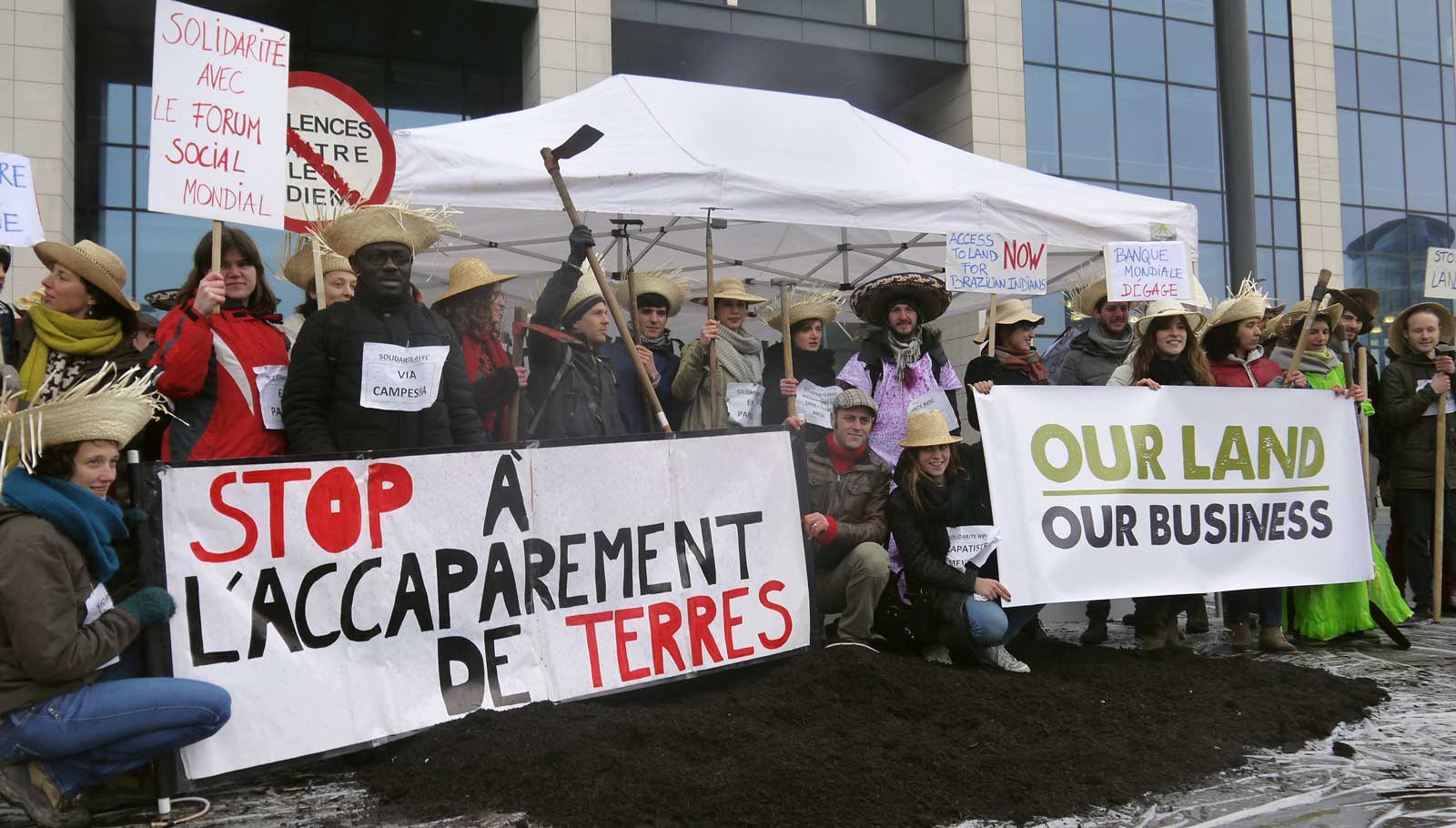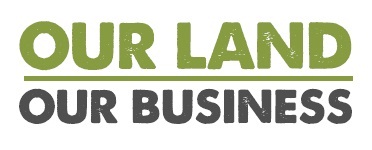
—FOR IMMEDIATE RELEASE—
September 16, 2021, 7:00 PM PT
Media Contact:
Anuradha Mittal, amittal@oaklandinstitute.org +1 510-469-5228
- The World Bank announced today it has discontinued publication of the Doing Business Report (DBR), following publication of internal audits and reviews into the report that revealed serious ethical concerns of data manipulation, shattering trust in the rankings.
- The DBR was used to drive policy and regulatory changes favorable to businesses and corporations. Ranking countries on the “ease of doing business,” orchestrated a race to the bottom pushing governments to dismantle labor rights, social and environmental safeguards to attract private investors.
- The cancellation of the DBR marks a major victory for the 280-organization strong Our Land Our Business Campaign, which has advocated since 2014 for an end to the DBR because of its disastrous impact on countries in the Global South, including through the grabbing of land and natural resources it encouraged.
Oakland, CA — On September 16, 2021 the World Bank announced it has discontinued publication of the Doing Business Report (DBR), in a major victory for people and the planet. The DBR had been “paused” after data irregularities were found in the 2018 and 2020 reports. The cancellation follows publication of internal audits and reviews into the irregularities that revealed serious ethical concerns of data manipulation, shattering trust in the DBR.
An explosive report to the Bank’s Board of Executive Directors, Investigation of Data Irregularities in Doing Business 2018 and Doing Business 2020, revealed how senior Bank officials applied pressure to manipulate data in order to improve rankings for select countries. Notably, the independent report exposed how then-Bank CEO (and current IMF Managing Director) Kristalina Georgieva1 applied “pressure” to “make specific changes to China’s data points in an effort to increase its ranking for the 2018 DBR” at a time the country was expected to increase its financial contribution to the Bank’s capital. Then-World Bank President Dr. Jim Yong Kim was also implicated in the effort to increase China’s ranking.2
Additionally, Simeon Jankov, one of the founders of the DBR and a Senior Bank official3 was implicated in altering Saudi Arabia’s data to boost the country’s ranking, in an effort to reward the country for the “important role it played in the Bank community.”4 These revelations follow previous allegations of data manipulation in 2018, when the World Bank’s then-Chief Economist, Paul Romer exposed how the DBR scores for Chile were skewed and politically manipulated to disfavor a progressive government.
Since DBR’s launch in 2002, the World Bank has ranked countries on the “ease of doing business,” i.e. on regulatory changes and reforms that make them more attractive to private investors. These “reforms” have included lowering corporate taxes, slashing environmental safeguards, social and labor standards, cutting administrative procedures, and removing restrictions to trade and business. The Oakland Institute has extensively documented the disastrous impact of these regulatory changes at the country level in dozens of countries. “Even before the extent of the data manipulation came to light and destroyed any credibility of the DBR, the rankings had been built on a flawed premise that rewards countries for reducing their labor standards, destroying the environment, and providing easy access for corporate pillaging and land grabs,” said Frédéric Mousseau, Policy Director of the Oakland Institute. “Today is a historic victory for the sustained campaign against the DBR and a step towards ending the race-to-the-bottom between countries vying for World Bank investment dollars,” Mousseau added.
Since 2014, the 280-organization strong Our Land Our Business campaign — comprised of NGOs, unions, farmers, and consumer groups from over 80 countries — has called for the end of the rankings. For over seven years, Our Land Our Business has waged an unwavering advocacy campaign, including letters, petitions, and mass protests around the world. Coordinating the campaign, the Oakland Institute has produced dozens of reports and advocacy materials providing in-depth analysis and monitoring of the impact of the DBR for people around the world.
“The evidence of manipulation of the rankings is a slap in the face of the poorest countries forced to deregulate their economies to attract investors against fallacious promises of aid and development. After this victory, members of the campaign will remain vigilant as the World Bank continues to leverage its influence and pressure countries to prioritize reforms that benefit corporate interests over true development,” said Oakland Institute’s Executive Director Anuradha Mittal. “The world needs development policies that serve people and protect the planet, not policies that focus on economic growth of the corporations,” Mittal concluded.
###

A Landmark Victory: World Bank Finally Ends Its Destructive and Corrupt Doing Business Report
—FOR IMMEDIATE RELEASE—
September 16, 2021, 7:00 PM PT
Media Contact:
Anuradha Mittal, amittal@oaklandinstitute.org +1 510-469-5228
Oakland, CA — On September 16, 2021 the World Bank announced it has discontinued publication of the Doing Business Report (DBR), in a major victory for people and the planet. The DBR had been “paused” after data irregularities were found in the 2018 and 2020 reports. The cancellation follows publication of internal audits and reviews into the irregularities that revealed serious ethical concerns of data manipulation, shattering trust in the DBR.
An explosive report to the Bank’s Board of Executive Directors, Investigation of Data Irregularities in Doing Business 2018 and Doing Business 2020, revealed how senior Bank officials applied pressure to manipulate data in order to improve rankings for select countries. Notably, the independent report exposed how then-Bank CEO (and current IMF Managing Director) Kristalina Georgieva1 applied “pressure” to “make specific changes to China’s data points in an effort to increase its ranking for the 2018 DBR” at a time the country was expected to increase its financial contribution to the Bank’s capital. Then-World Bank President Dr. Jim Yong Kim was also implicated in the effort to increase China’s ranking.2
Additionally, Simeon Jankov, one of the founders of the DBR and a Senior Bank official3 was implicated in altering Saudi Arabia’s data to boost the country’s ranking, in an effort to reward the country for the “important role it played in the Bank community.”4 These revelations follow previous allegations of data manipulation in 2018, when the World Bank’s then-Chief Economist, Paul Romer exposed how the DBR scores for Chile were skewed and politically manipulated to disfavor a progressive government.
Since DBR’s launch in 2002, the World Bank has ranked countries on the “ease of doing business,” i.e. on regulatory changes and reforms that make them more attractive to private investors. These “reforms” have included lowering corporate taxes, slashing environmental safeguards, social and labor standards, cutting administrative procedures, and removing restrictions to trade and business. The Oakland Institute has extensively documented the disastrous impact of these regulatory changes at the country level in dozens of countries. “Even before the extent of the data manipulation came to light and destroyed any credibility of the DBR, the rankings had been built on a flawed premise that rewards countries for reducing their labor standards, destroying the environment, and providing easy access for corporate pillaging and land grabs,” said Frédéric Mousseau, Policy Director of the Oakland Institute. “Today is a historic victory for the sustained campaign against the DBR and a step towards ending the race-to-the-bottom between countries vying for World Bank investment dollars,” Mousseau added.
Since 2014, the 280-organization strong Our Land Our Business campaign — comprised of NGOs, unions, farmers, and consumer groups from over 80 countries — has called for the end of the rankings. For over seven years, Our Land Our Business has waged an unwavering advocacy campaign, including letters, petitions, and mass protests around the world. Coordinating the campaign, the Oakland Institute has produced dozens of reports and advocacy materials providing in-depth analysis and monitoring of the impact of the DBR for people around the world.
“The evidence of manipulation of the rankings is a slap in the face of the poorest countries forced to deregulate their economies to attract investors against fallacious promises of aid and development. After this victory, members of the campaign will remain vigilant as the World Bank continues to leverage its influence and pressure countries to prioritize reforms that benefit corporate interests over true development,” said Oakland Institute’s Executive Director Anuradha Mittal. “The world needs development policies that serve people and protect the planet, not policies that focus on economic growth of the corporations,” Mittal concluded.
###